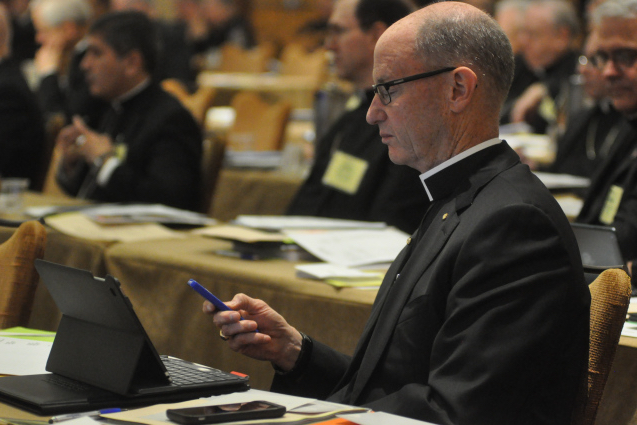It’s unlikely that many of the Catholic bishops who voted last week to make permanent their (formerly) Ad Hoc Committee on Religious Liberty saw the irony when several of their fellow prelates sharply criticized the GOP health care bill making its secretive way through the Senate as potentially devastating to many vulnerable populations.
San Diego Bishop Robert McElroy called it a “breathtaking” assault on Catholic social teaching that will “deliberately fall apart in the coming years from market forces and ever smaller amounts of government revenue.” Montana Bishop George Thomas warned of “potentially catastrophic effects” on the lives of “children and the elderly, the seriously ill, the immigrant and the nation’s working poor.”
While the bishops’ low-profile Domestic Justice Committee has criticized several components of the House-passed American Health Care Act, and urged Republicans not to repeal the ACA without a replacement, the conference as a whole has been largely silent on the GOP health reform effort that now appears to be entering its final stages.
Unlike the vigorous effort it put into urging Catholics to oppose the Affordable Care Act if it didn’t ban access to abortion or the ACA’s contraceptive mandate, the bishops’ conference hasn’t attempted to harness Catholic opposition to the measure. And, at this late point in the game, with a Senate vote slated for as early as next week, there’s little chance they could effectively do so even if they wanted to.
At the same time, the bishops voted overwhelmingly to make their Religious Liberty Committee permanent. It was the Religious Liberty Committee, under the direction of Baltimore Archbishop William Lori, that was largely responsible for demonizing the contraceptive mandate, and by extension the ACA, as an assault on “religious liberty,” helping to pave the way for successful Republican attacks on the health reform law.
A new Washington Post/Kaiser Family Foundation poll shows just how successful the effort to forge the church’s opposition to reproductive and LGBT rights into a new political wedge issue to motivate right-leaning religious voters has been. According to the poll, which probed the political divide between urban and rural voters:
Nearly 6 in 10 people in rural areas say Christian values are under attack, compared with just over half of suburbanites and fewer than half of urbanites. When personal politics is taken into account, the divide among rural residents is even larger: 78 percent of rural Republicans say Christian values are under attack, while 45 percent of rural Democrats do.
This particular divide, and this widespread sense of Christian persecution, is relatively recent. As Julie Ingersoll noted here on RD, while evangelical leaders had tried to gin up a sense of Christian persecution going back to the mid-1990s, as late as 2005, “the argument that Christians were a minority in need of protection was not persuasive in the broader religious right.” But a “little over a decade later, conservative Christians across the country … now see themselves as targeted by powerful elites, one step away from imprisoning and executing people for their faith.
The lynchpin was the bishops’ claim that Catholic health care institutions, and by extension Catholic nuns, were being forced to provide abortifacients in violation of their consciences, which was quickly extended to bakers, photographers and others who opposed same-sex marriage. Evangelical leaders quickly took up the baton, conflating domestic assaults on “religious liberty” with the real world persecution of Christians in other countries.
And it’s this religious liberty effort, not protecting access to health care for millions, that remains at the heart of the bishops’ lobbying efforts. Lori warned the bishops that even with the election of Donald Trump the fight for religious liberty was far from over and said they needed to gird for new challenges, such as the granting of rights to transgender people.
While the bishops’ opposition to the Republican overhaul of health care remains piecemeal and lacks the imprimatur of the entire conference, the Religious Liberty Committee enjoys high-profile leadership, speaks with the full backing of the bishops’ conference, and has a staff and a dedicated budget. The Knights of Columbus and other right-leaning Catholic groups have contributed some $500,000 to the committee since it was founded in 2011 and Lori assured the bishops that the outside funding would continue.
Two of Pope Francis’ appointees, however, were notably outspoken about the bishops’ lack of nuance in their policies, the overly political impacts of their priorities, and the impact on populations the conference claims to protect. Chicago Cardinal Blase Cupich was the only bishop to make explicit that the Republican health overhaul effort was “tied to hundreds of billions of dollars worth of tax cuts” and urged the bishops to “talk about uncoupling these efforts.”
But good luck trying to get the Dolan-Kudlow faction of the church’s leadership to oppose tax cuts for the wealthy, even if it comes at the expense of health care for the poor.
And in an implicit rebuke of the political priorities signaled by a freestanding Religious Liberty Committee, Newark Cardinal Joseph Tobin questioned why the work of the committee couldn’t be folded into the Committee on Domestic Justice and Human Development. But in the end, he was voted down 132 to 53, which gives you a pretty good idea of the political priorities of the U.S. bishops.


